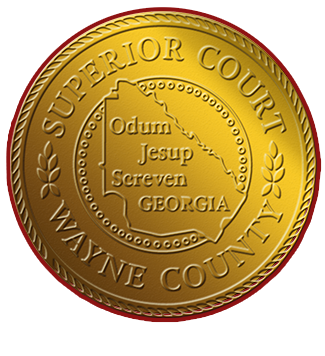RECORD RETENTION SCHEDULE FOR COURTS
| This summary is provided as a broad outline of current Georgia records keeping laws. It is intended as a reference tool to assist in understanding the many laws regarding public record keeping and not as a definitive legal resource. Questions regarding any of summaries provided should be directed to your legal counsel. Archives, established O.C.G.A. 45-13-40: establishes the Department of Archives and History as part of the Secretary of State’s office. Archives, responsibilities and duties O.C.G.A. 45-13-41: ensures the retention and preservation of the records of any state or local government agency. O.C.G.A. 50-18-93: states that the Department of Archives and History shall establish and administer a records management program; develop and issue procedures, rules and regulations establishing standards for a records management program; assist state agencies with their records management programs; and operate a records center or centers. O.C.G.A. 50-18-99(f): states that the Department of Archives and History shall provide local governments with a common record retention schedules and advise which historical records may be deposited in the Georgia Archives.Attorney General Opinion 75-84: states that the responsibilities of the Department of Archives and History are limited to the distribution of rules and regulations, training and consultative visits to agencies. County Documents, definition O.C.G.A. 36-9-5: defines a “county document” as any record documenting property rights, deeds, and wills and tax records documenting ownership and the latest valuations. County Documents, Storage of O.C.G.A. 36-9-5: requires county documents to be stored in a fireproof safe, vault or container or on microfilm or at a location that is not more than 100 miles from the county and within the State of Georgia. O.C.G.A. 50-1: states that the department of Archives and History shall advise local governments of historical records that may be stored in the Georgia Archives. Court Records, Storage of O.C.G.A. 15-6-86: states that the clerk of superior court with the written permission of the governing authority and the superior court judge may store court records in a data storage and retrieval facility outside the originating county provided the facility meets certain contractual requirements and the facility is in the State of Georgia. Inspection of Public Records O.C.G.A. 50-18-70 et. seq.: provides guidelines and criteria for the inspection of public records. Also known as the “Open Records Act”. Local Government, Governing Body, definition O.C.G.A. 50-18-99a)(1) defines “governing body’ as the governing body or authority of any county, municipality, consolidated government and school board.Local Government, responsibilities O.C.G.A. 36-9-5(3): requires the county governing authority to furnish fireproof equipment, microfilming equipment or some other safe facility for county documents. Micrographics O.C.G.A. 50-18-93: permits the Department of Archives and History has the authority to develop and issue standards for the microfilming of records. O.C.G.A. 50-18-120: provides the authority to establish microform standards with the state records committee. Microfilm Resolution, approved 1-18-1996: permits the destruction of all paper records of state agencies and local governments that have been filmed in accordance with micrographic standards approved by the state records committee unless specifically prohibited. Ownership and Title of Public Records O.C.G.A. 50-18-98: states that the ownership and title of records transferred to the Georgia Archives transfers with those records and that the ownership and title to records transferred to the (a) records center remains with the creating agency. Public Agency, definition O.C.G.A. 50-14-1: states that every state department, agency, board, bureau, commission, public corporation, and authority; every county, municipal corporation, school district, or other political subdivision of this state; every department, agency, board, bureau, commission, authority, or similar body of each such county, municipal corporation, or other political subdivision of the state; every city, county, regional, or other authority established pursuant to the laws of this state; and any nonprofit organization which has a direct allocation of tax funds from a governing authority of any agency that is than 33 1/3 percent of the total funding for that organization is a public agency. O.C.G.A. 50-18-70(a): states that any association, corporation, or other similar organization which has a membership or ownership primarily of counties, municipal corporations, or school districts and derives a substantial portion of its operating budget from these political subdivisions is an “agency” or “public agency”. O.C.G.A. 50-18-91(1): defines an “agency” as any state office, division, board, bureau, commission, authority, or other unit of state government created or established by law. Public Record, definition O.C.G.A. 50-18-70(a): defines “public records” as all documents, papers, letters, maps, books, tapes, photographs, computer based or generated information, or similar material prepared and maintained or received in the course of the operation of a public office or agency. This also means such items that are received or maintained by a private person, firm, corporation or other private entity in the performance of a service or function on behalf of a public office or agency. O.C.G.A. 50-18-91(5): defines “records” as all documents, papers, letters, maps, books, microfilm, magnetic tape, or other material, regardless of physical form of characteristics, made or received pursuant to law or ordinance or in performance of functions by an agency. O.C.G.A. 50-18-99(c): states that all records created or received in the performance of a public duty of paid for by public funds by a governing body are deemed to be public property and shall constitute a record of public acts. Records Management Officer (RMO) O.C.G.A. 50-18-94: requires every state agency to designate a records management officer to operate the agency records management program. State Records Committee O.C.G.A. 50-18-92: creates the state records committee with the authority to review, approve, disapprove, amend or modify retention schedules. State Agency Head O.C.G.A. 50-18-95<: states that agency heads have the authority to determine the nature and form of records required for the administration of their departments. Attorney General Opinion 75-84: states that the agency head has direct supervisory control over his/her agency records management officer and subject to state records committee approval direct control over his/her records management program State Agency responsibility O.C.G.A. 50-18-94: lists the duties and responsibilities of state agencies as pertaining to the establishment and maintenance of an agency records management program. Vital Records, definition O.C.G.A. 50-18-91(10): defines any record that is vital to the resumption, continuation, or maintenance of an agency’s operations and responsibilities. |








